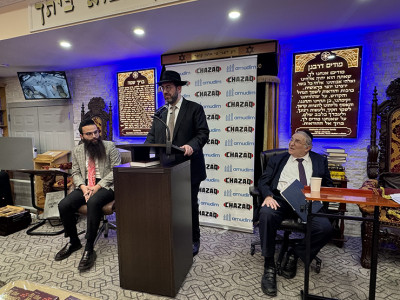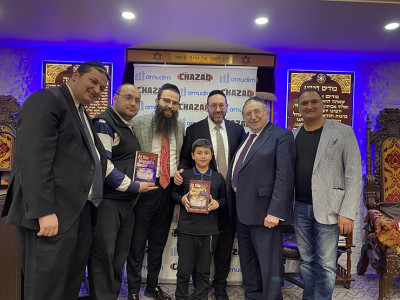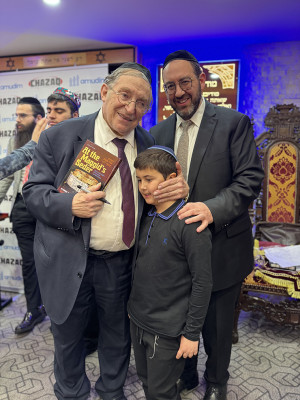


The Bukharian Congregation of Briarwood featured an inspiring event titled “Elevating Your Relationships and Unveiling the Secrets of Pesach,” featuring Rabbi Paysach Krohn, well known mohel, author, and speaker, and Rabbi Yisrael Abisror, founder and CEO of Lincoln Square & Co. and Board Member of the Talmudic College in Orlando, Florida. The shiur was hosted by Chazaq, Amudim, and UJA.
Rabbi Simantov Yanetz, Rav of the Bukharian Congregation of Briarwood, welcomed the crowd and shared that it is a great kiddush Hashem to come out at this busy time of year when everyone is preparing for Pesach. He then posed the following question: What is the job of a rabbi? He offered several possible responses and then he stated, “The real job is one sentence: It is to bring his k’hilah close to Hashem in every way possible.”
Next, Rabbi Abisror shared that when we move through the chagim, there is a theme for each one. On Rosh HaShanah, the theme is kingship, and on Sukkot it’s simchah. Pesach’s theme is freedom. We hear these ideas, and they are mentioned over and over. Yet, we don’t truly tap into the essence of the holiday. We hear the themes and ideas, but we can get bogged down with details and forget the main idea. When this happens, we experience a void inside. Rabbi Yochanan Zweig was once speaking at a conference of psychologists and therapists. Rabbi Zweig said that the number one issue in relationships is that one person is trying to control the other. The therapists all concurred that this is the biggest problem.
Rabbi Abisror taught that a reason we struggle and feel the need to control is because we struggle with having to conform to societal norms. Pesach can help us change how we look at ourselves. The month of Nisan is the month of freedom. The Sages say that Nisan is imbedded by Hashem with freedom, so the holiday of freedom is in Nisan. The Chachamim teach that when we gain true freedom, it will come in Nisan.
The Haggadah contains so many fine details and insights. There is a special mitzvah to recall the story of the Jews leaving Egypt. The first mitzvah that the Jewish people received as a people was Rosh Chodesh. “Chodesh” has the root of chidush, which means new. The key ingredient we need in relationships is the ability to constantly start anew. “You have to stop, process, and create newness in the relationship.” Act in a different new way. Bring newness into it and establish healthier relationships. On Pesach, we move from being slaves to being free. Being free means you must be willing and able to become new.
Hashem tells the Jews that we were in Egypt for a long time and things grew worse and worse. Hashem said that if I take you out, then you have to say now that I am a new person. This newness allows me to be free. An individual can sometimes not grasp the opportunity to change. “If I am still in the reality of yesterday, then today can’t give me anything unless today is new.”
He emphasized that freedom starts with being new. Sometimes, when we try to be new, we make the mistake of forgetting the past. We need to utilize our past to help move us forward. If we forget our trials and tribulations, we can’t survive. We need to take our past with us in our relationships and decide that we are going to change and use the trials and tribulations to live life to the fullest. We learn how we should react to things in the future. These challenges help us to grow.
Take a moment to think about where you were last year with your relationships. Where are you struggling? What can you learn from these experiences? This approach will help a person to not need to struggle for power. “Take one idea and use it to carry you through the chag.”
Following this, Rabbi Paysach Krohn said that everybody has to come closer to Hashem. That is what a rav is all about, as Rabbi Yanetz said.
He shared a powerful story about a father and son in a concentration camp who were the only survivors of their family. The son asked to recite the Four Questions, which he knew by heart on Pesach. Then he asked his father, “Aba, I have a fifth question: Will you and I be alive next year so that I can ask you these questions?”
The father responded truthfully: “I don’t know if we will be here, but I know that for sure there will be boys asking fathers the Four Questions all around the world. Hashem promised us that the Jewish people will survive.” This is a comforting and important reminder to us today with the war in Israel and the threats of anti-Semitism around the world. Every morning and night we recite and recall that Hashem took us out of Mitzrayim. We recite this, morning and night, to symbolize good times and bad times, that we should remember Hashem’s promise to us. The Haggadah tells us that we are going to make it and survive, no matter what. We have to feel good and proud.
He acknowledged that in the Bukharian community here in Queens, there are parents and grandparents who never imagined having a shul like this one. The country they came from would not allow such a thing. “We don’t know what tomorrow brings, but we know that the Jewish people will be here no matter what!”
Rabbi Krohn taught that we have to think about how to give over this positive feeling of bitachon to our children. Klal Yisrael is all about relationships with our children. Moshe insisted to Pharaoh that he needed to bring out the children because the children are so important. They are the future of klal Yisrael. Rabbi Krohn said, “Look at the school your children are attending. In the yeshivot, they are growing and learning more and more Torah. Kids will inspire all of us. It is so important to have good relationships with each other, with Hashem, and with our families. Pesach is a time when we are connected to our families.”
He shared a story from the Gemara where Eliyahu HaNavi was walking with Rabbi Broka, and Eliyahu pointed to two people and said these two are going straight to Olam HaBa. Rabbi Broka asked them what they do. They replied, “We are happy people. We make people who are sad happy.”
Rabbi Krohn shared the question: Why did they first say that they are happy people? He explained that the Mei’am Lo’eiz teaches us that if someone wants to make his wife and children and his co-workers happy, he has to be happy. The first lesson in how to create a happy house is that you have to be happy. If you have an unhappy spouse, then look at yourself. He admonished everyone, “Learn not to yell and scream.”
Rav Matisyahu Salomon taught: Kids are not drop-outs, but rather they are pushouts when we yell at them.
Rabbi Krohn emphasized: “A house has to be a happy place.” Children are deeply affected by the way parents demonstrate respect for each other. If parents criticize each other, this creates an impact on children that marriage is an unsafe place.
When was the last time you said nice things about your spouse in front of your children? “Look for the good in each other and give compliments.” If you have a happy house, then you can teach children mitzvot. He shared a quote: “The right temperature in a home is maintained by warm hearts, not hot heads.”
Rav Schwab taught an important lesson that we glean from the Four Sons in the Haggadah. We introduce the Four Sons by saying “Baruch HaMakom.” This is an expression we usually recite on sad things. We say it at the Seder because sometimes children at the Seder are off the straight path. Yet, these children are introduced, as the Baal Haggadah says the word “baruch” four times, because every child is a blessing. Rabbi Krohn implored everyone: “Never give up on a child. Every child can come back.”
He pointed out that, ”everyone can accomplish.” Also, never give up on yourself.
He shared a powerful t’filah that everyone should share at the Seder table. It was composed by Rav Yissachar Davids of Rotterdam, Holland, in the Bergen-Belsen concentration camp for the Jews there who had to eat chametz during Pesach in order to survive. We should share this to remind us to be grateful that we live in a free country and we should never forget how grateful we should be. (See sidebar)
Rabbi Krohn urged that now is the time to invite people for Pesach meals – reach out.
The holiday of Pesach means rachamanut and that is what it’s all about. Rav Shlomo Wolbe taught the two vital things that children need. These are love and time. Every child needs our undivided attention. “Who else will validate your child except you?”
The future of klal Yisrael is our relationship with our children. We will triumph over Hamas. That is the guarantee in the Haggadah.
This writer recommends Rabbi Krohn’s amazing Haggadah filled with inspiring stories and thoughts. It’s great to start studying it now and it will enhance your Seder.
Rabbi Krohn shared several inspiring stories. Everyone left uplifted and motivated to work on the ideas taught in this beautiful program held on Sunday evening, March 31.
Rabbi Krohn shared that “many people read this t’filah at their Seder table to teach the assembled the m’sirat nefesh of Jews in the concentration camps and the gratitude we must have to Hashem for the conditions we live in today.”
By Susie Garber
Rabbi Paysach Krohn And Rabbi Yisrael Abisror Speak In Briarwood
Typography
- Smaller Small Medium Big Bigger
- Default Helvetica Segoe Georgia Times
- Reading Mode


